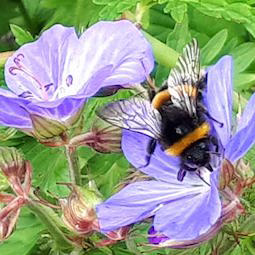Jubilee for the Earth - looking to Laudato Si' Week

Image: Natalie Tobert
Laudato Si': On Care for Our Common Home, Pope Francis' groundbreaking encyclical, is five years old this month. It's a time to celebrate the beginnings of "ecological conversion" in our lives and Churches. We've seen such initiatives as a growth in Livesimply parishes and schools, the planting of trees to celebrate sacramental occasions, and advocacy to reduce dependence on fossil fuels.
But, how relevant is Laudato Si' Week 16-24 May in the context of the coronavirus pandemic? We have seen the October Biodiversity conference in China and the November climate conference in Scotland postponed. The Climate Coalition Lenten vigil for the climate at Westminster had to go virtual after lockdown. Yet, the new quietness has revealed that the birds sing beautifully, the resurgent Spring blossoms lift the human spirit, and that Earth can heal.
The 2020 coronavirus pandemic prompts greater appreciation of God's creation; and also a deeper understanding of global links that should help us address the on-going public health threats of the climate crisis and biodiversity loss. We understand better how any emergency, such as the expanding range and spread of vector-borne diseases like malaria or dengue, or the increasing frequency and strength of extreme weather events, hit the most vulnerable and poorest the hardest. But they hit us too.
Nature is sending us a message with the coronavirus pandemic and the ongoing climate crisis, according to the UN's environment chief, Inger Andersen. Destructive practices - such as logging, mining, industrial farming - which drive wildlife into contact with people must be reviewed. Live animal markets - an ideal mixing bowl for disease - must end. She highlighted other environmental impacts in 2020, such as the huge Australian bushfires and the worst ever locust invasion in West Africa. "The financial and social support packages to maintain and eventually resuscitate the global economy post-pandemic should therefore promote health, equity, and environmental protection" Anderson said; "we must transition to a more resilient, zero-carbon, just and healthier future, and resources must be directed this way". She reflected that, "the virus reminds us, by oppressing us for a short time, of those in this world whose whole life is spent in oppression".
'Jubilee for the Earth' is the theme of Autumn's Season of Creation. And a 'Creation Sunday' in September will be introduced. Let us note that high biodiversity reduces the risk of animal-vectored diseases in human populations, yet three-quarters of the earth's land surface and 66% of the marine is significantly altered by human activity, habitats are destroyed and degraded, and one million species are at risk of extinction. A Jubilee will mean strangleholds of debt and poverty being lifted, and the planet being delivered from human-induced environmental disasters.
Hopefully, the pandemic has taught us to see security in a new way. For decades, experts have warned of the risks of global threats that are simply too big for one country to handle, such as disease pandemics, climate change, and nuclear war. The response of our political leaders has fallen short. Spending priorities and modes of thinking about security have been defined in military terms.
In early April, Pope Francis and Pax Christi endorsed the United Nations' call for a global ceasefire.
"The threats we face as a planet, health pandemics and climate change among them, demand a coordinated international response with no room for continuing to waste resources on armed conflict," said Pax Christi.
We have also learnt that global challenges require systemic changes by government, the corporate world, and individual behaviour. We have seen over recent weeks that governments can take radical action and that we can change our behaviour quickly. This crisis is teaching the world much about the values of compassion and fairness, and the ability of societies to care for the most vulnerable as the basis of security. We have been heartened by the strengthening of community bonds across the nation.
We have learnt that prevention is better than cure. It's cheaper and safer to prevent people from catching and spreading a virus than to treat huge numbers of cases at once. With climate change, it is better to prevent runaway temperature rises than to figure out how to deal with the consequences.
Our amazing planet is in peril from climate change and the loss of habitats and species. And yet this moment of eclipse, where darkness is passing in front of our normally ordered lives, is a once-in-a-lifetime opportunity to stop, and to say that real, lasting change is possible. We have stopped for a virus. Let's use this time to think hard about what we want the world to look like when we come out the other side.
We must recognise climate instability and biodiversity loss as crises and tackle them with the same conviction as demonstrated during the pandemic. We must learn basic lessons about cooperating with each other, about listening to experts, and about the role that governments can play when they put their minds to it. 'Jubilee for the Earth' is a timely theme for the Season of Creation - 1 September to 4 October. Bishop Marc Stenger of Troyes, Co-President of Pax Christi, said last month: Laudato Si' "is a monumental gift which could become more and more our Charter in the post-coronavirus era".
This editorial was first published by editor Ellen Teague, in the latest edition of Vocation for Justice a 12-page magazine sent out three times a year by the Columbans to partners and friends working on Justice, Peace and Ecology.
Read Vocation for Justice Summer 2020 online at: https://columbans.co.uk/wp-content/uploads/2020/04/Newsletter-May-2020.pdf
Request hard copies of Vocation for Justice magazine at: Email: v4j@columbans.co.uk


















